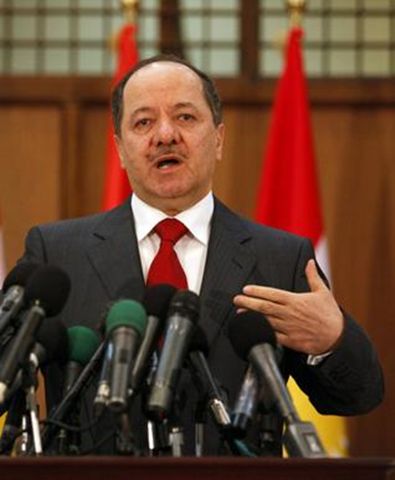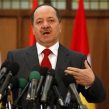
Between Baghdad and Ankara: The Kurdistan Regional Government’s Delicate Balance
Publication: Terrorism Monitor Volume: 8 Issue: 41
By:

Since the fall of Saddam Hussein in 2003, the Kurdistan Regional Government (KRG) has maintained a cautiously optimistic but delicate balance to secure its existence amidst perilous surroundings.
The first and most immediate dimension of this balancing act is the KRG’s precarious relationship with the Iraqi central government in Baghdad. These relations have been frozen due to the inconclusive Iraqi national elections of March 7, 2010 and the resulting hung parliament. However, even if the Kurds eventually prove to be the kingmaker in this electoral imbroglio, once a new central government emerges in Baghdad, the inherently more powerful Arab majority will again begin pressuring the Kurds for concessions. [1]
The second factor is the KRG’s relationship with Turkey, a situation that has improved dramatically since the initial days following Saddam Hussein’s fall when Turkey drew “red lines” against so-called Kurdish warlords. Thriving economic relations between the two, however, gradually led to better political relations. [2] In May 2009 the new Turkish foreign minister, Ahmet Davutoglu, announced his state’s innovative foreign policy of “zero problems with its neighbors.” [3] Among many other issues, this means that instead of viewing the Iraqi Kurds as an existential enemy threatening its territorial integrity, Turkey now views the KRG through less hostile, potentially cooperative lenses. In October 2009, Davutoglu brought this new policy home by actually visiting Irbil. Then, in March 2010, Turkey opened a high-powered consulate in Irbil that serves as a de facto embassy (Today’s Zaman, February 17). Finally in June 2010, KRG president Massoud Barzani successfully returned Davutoglu’s earlier visit by journeying to Ankara, where he was most significantly received with his official title of KRG president (Today’s Zaman, July 6). Although the issues of Kirkuk and the Partiya Karkeren Kurdistan (PKK – Kurdistan Workers’ Party) still remain to cloud relations, it is now practical to envision Turkey as a possible friend, or even protector, if the KRG’s relationship with Baghdad deteriorates. [4]
The third aspect of the KRG’s delicate balance concerns its relationship with the United States, the KRG’s creator and ultimate protector. However, as the United States begins to wind down its mission in Iraq and assume a non-combat, background role, one wonders what this means for the KRG in the long-term. [5] Many Kurds hope that a residual U.S. presence in the form of American troops training Iraqi soldiers and shepherding joint Iraqi-KRG troop patrols (so-called Combined Security Mechanisms) on the dividing line in the internally disputed areas will be capable of successfully maintaining this delicate balance. [6] Barzani visited Washington last January and met with U.S. president Barack Obama and other senior officials, receiving assurances of continued U.S. support. [7] The KRG maintains a liaison office just nine blocks north of the White House. Qubad Talabani, the son of the Iraqi president, continues as the young and dynamic head of this office as the KRG representative in the United States. In May, the U.S. House of Representatives approved Resolution 873 calling for a U.S. consulate in Irbil. At the end of August, Fuad Hussein, chief-of-staff to President Barzani, conducted a week of meetings with U.S. officials, members of Congress, and the staffs of the Senate Foreign Relations Committee and the House Foreign Affairs Committee. [8]
The fourth dimension concerns the KRG’s own internal situation. The KRG has been ruled by the so-called Kurdistani List, an alliance of the Kurdistan Democratic Party (KDP) and the Patriotic Union of Kurdistan (PUK), since the fall of Saddam Hussein after settling their own civil war, which raged from 1994 to 1998. Although this alliance was necessary to avoid further internal strife, the Kurdistani List is reminiscent of the Grand Coalitions that ruled Germany during 1966 to 1969 and then again from 2005 to 2009. Both times these coalitions performed adequately, but ultimately impaired German democracy because they left only small parties to oppose and criticize. Thus, they made citizens feel that no one could seriously criticize the government, that politics was a game manipulated by the powerful and that democracy was simply a facade. A good democracy requires a lively interplay between the “ins” and the “outs,” rather than complicity between them.
Thus, the rise of Nawshirwan Mustafa’s Gorran (Change) Party at the expense of the PUK creates novel possibilities and uncertainties for the KRG, giving it for the first time real opposition in the 111-seat parliament. Rancor and even shootouts between PUK and Gorran supporters, however, serve as an ominous reminder of bloody past intra-Kurdish struggles (see Terrorism Monitor, May 10, 2007). This new party won an impressive 25 seats in the July 25 KRG parliamentary elections, but only a disappointing eight in the March Iraqi national elections (see Terrorism Monitor, April 2). To maintain a united Kurdish front against Baghdad, Gorran subsequently agreed to cooperate with the Kurdistani List.
An aging Jalal Talabani (born in 1933) might either continue as president of Iraq and secretary-general of the PUK or depart from the political scene. Either way, however, it is clear that he will not remain in politics much longer. Does this mean that Massoud Barzani’s KDP will gain dominance over the KRG? It is difficult to see how the PUK can regain its former equal position. Aside from Talabani, the rest of the PUK leadership is in a state of flux. Nawshirwan Mustafa quit the PUK to head the Gorran Party and Kosrat Rasul has long been ailing. Barham Salih, the current KRG prime minister and PUK politburo member, is bright and capable, but lacks deep roots within the party as he was only brought from abroad and installed by Talabani in 2001. Recently Salih vouched how closely he has been able to work with Massoud Barzani (ekurd.net, October 18). Last February, however, when Barzani journeyed to Washington to visit President Obama and other U.S. officials, some Americans criticized Barzani for leaving out Barham Salih but bringing along his nephew, Nechirvan Barzani, and son, Masrour Barzani (ekurd.net, February 14).
What does all this mean for the already existing problems regarding corruption, nepotism, transparency and civil liberties? [9] These problems can only grow worse unless the KRG authorities manifest a renewed determination to follow the rule of law. In May, for example, Sardasht Osman, a 23-year-old journalist who had been critical of the KRG, KDP and Barzani family, was kidnapped in broad daylight in Irbil and then murdered. After a few months, the KDP lamely announced that its secret investigation found that Osman had been killed by an insurgent group because he had refused to work with them. According to one Kurdish media source, this finding has “seriously undermined the authority of the KRG” by illustrating how it is willing to cover up crime and operate outside of the purview of any independent judiciary. [10]
In addition, the continued existence of the PKK and the allied Partiya Jiyana Azad a Kurdistane (PJAK – Party of Free Life of Iranian Kurdistan) in the Kandil Mountains is a situation that leads to constant threats of Turkish and Iranian cross-border shelling and military intervention. Although this state of affairs will remain an irritant, the PKK and PJAK presence in Iraqi Kurdistan is not likely to escalate into KRG-threatening scenarios, as none of those involved would benefit from the collapse of the KRG. Turkey and Iran seek to balance each other in the region; neither would accept the other becoming dominant over the KRG. For its part, the KRG will never flagrantly support these insurgent groups enough to draw in Turkey and/or Iran fully because to do so would threaten the KRG’s existence. As long as the KRG remains part of Iraq, that state’s internationally recognized borders will prevent Turkey and/or Iran from seeking to permanently incorporate the KRG. Of course, if Iraq collapses, all bets are off.
The future of Kirkuk is another crucial internal threat to the KRG’s existence, as is the future role of the Islamist elements in the KRG. In the parliamentary elections of July 2009, the Kurdistan Islamic Union, led by Salahaddin Bahauddin, won 5 seats in the 111-seat parliament, while Ali Bapir’s Kurdistan Islamic Group garnered 4 seats. Although Islamic groups will continue to exist, they seem too splintered and weak at the moment to constitute a major threat. [11]
Finally, other threats to the KRG’s balance concern its position in the regional Middle Eastern arena, where a potentially hostile Arab world still regards the KRG’s existence as a threat to the regional Arab patrimony. The larger Arab region, however, is too divided and consumed by its own problems to threaten the KRG in any major way. In addition, so long as the KRG remains a federal state within Iraq, that state’s territorial integrity offers the KRG protection. Finally, both the EU and UN look favorably upon the KRG, but are unlikely to disturb its equilibrium in any meaningful way because both are not immediately involved with the situation and have many more important problems with which to deal.
Notes:
1. See, for example, the recent report that the United States has proposed selling $4.2 billion worth of arms to Iraq to strengthen its military. The package includes 18 Lockheed Martin F-16 strike jets, Raytheon AIM-9 Sidewinder air-to-air heat-seeking missiles, laser-guided bombs and reconnaissance equipment. The KRG would have nothing to match this (UPI, October 1). For the KRG’s military inferiority, see Terrorism Monitor, March 26, 2010.
2. See Michael M. Gunter, The Kurds Ascending: The Evolving Solution to the Kurdish Problem in Iraq and Turkey (New York: St. Martin’s Press, 2008), pp. 41-42.
3. See Ahmet Davutoglu, “Turkey’s Foreign Policy Vision: An Assessment of 2007,” Insight Turkey 10(1), 2008, pp. 77-96.
4. See Liam Anderson and Gareth Stansfield, Crisis in Kirkuk: The Ethnopolitics of Conflict and Compromise (Philadelphia: University of Pennsylvania Press, 2009).
5. Anthony H. Cordesman and Charles Loi, Iraq: The Realities of U.S. ‘Withdrawal of Combat Forces’ and the Challenges of Strategic Partnership (Washington, D. C.: The Center for Strategic and International Studies, 2010). https://csis.org/publication/iraq-realities-us-withdrawal-combat-forces-and-challenges-strategic-partnership-O.
6. Colin H. Kahl, “Breaking Dawn: Building a Long-Term Strategic Partnership with Iraq,” Foreign Policy, August 31, 2010.
7. Kurdistan Regional Government (KRG), “Statement on President Barzani’s Meeting with President Obama,” January 25, 2010. https://www.krg.org/articles/detail.asp?smap=02010100&Ingnr=12&rnr=223&anr=33539.
8. Kurdistan Regional Government, “Top KRG Officials Visit U.S.,” [KRG] U.S. Liaison Office Newsletter, September 2010. www.knowkurdistan.com.
9. For background, see Daily Star (Beirut), November 18, 2005 and Michael Rubin, “Dissident Watch: Kamal Sayid Qadir,” Middle East Quarterly 13 (Spring 2006), pp. 95-96.
10. Rebwar Fatah, “The Quest for Civil Society in Kurdistan: Sardasht Osman’s Enquiry,” Kurdishmedia.com, October 18, 2010. www.kurdishmedia.com/article.aspx?id=16511.
11. For background, see David Romano, “An Outline of Kurdish Islamist Groups in Iraq.” Jamestown Foundation Occasional Papers Series, September 17, 2007. https://www.jamestown.org/uploads/media/Jamestown-RomanoIraqiKurds_01.pdf. However, see also Michael Rubin, “The Islamist Threat from Iraqi Kurdistan,” Middle East Intelligence Bulletin, December 2001. https://www.michaelrubin.org/1208/the-islamist-threat-from-iraqi-kurdistan.





